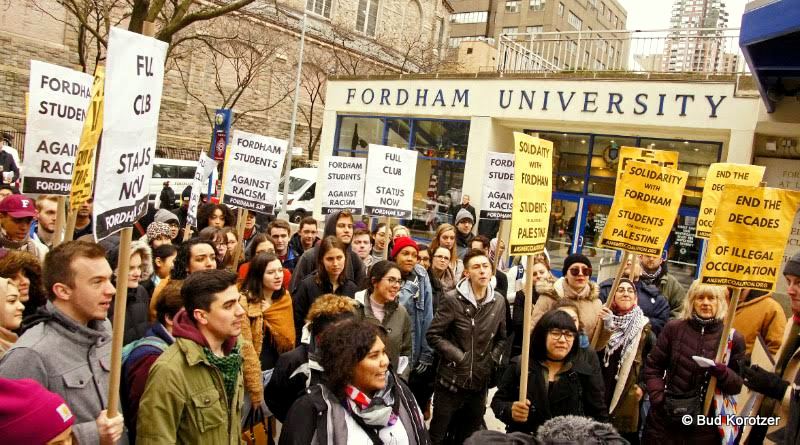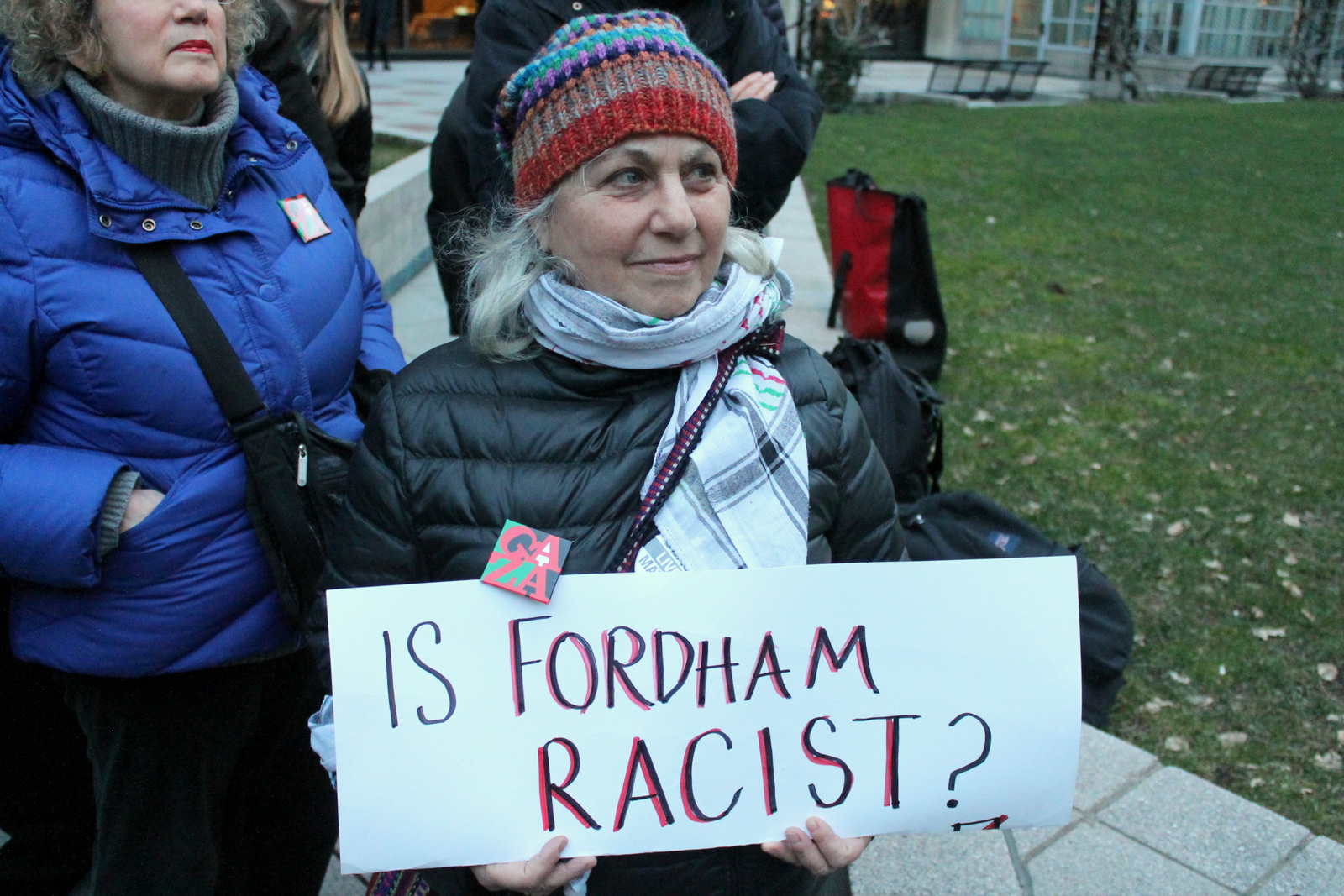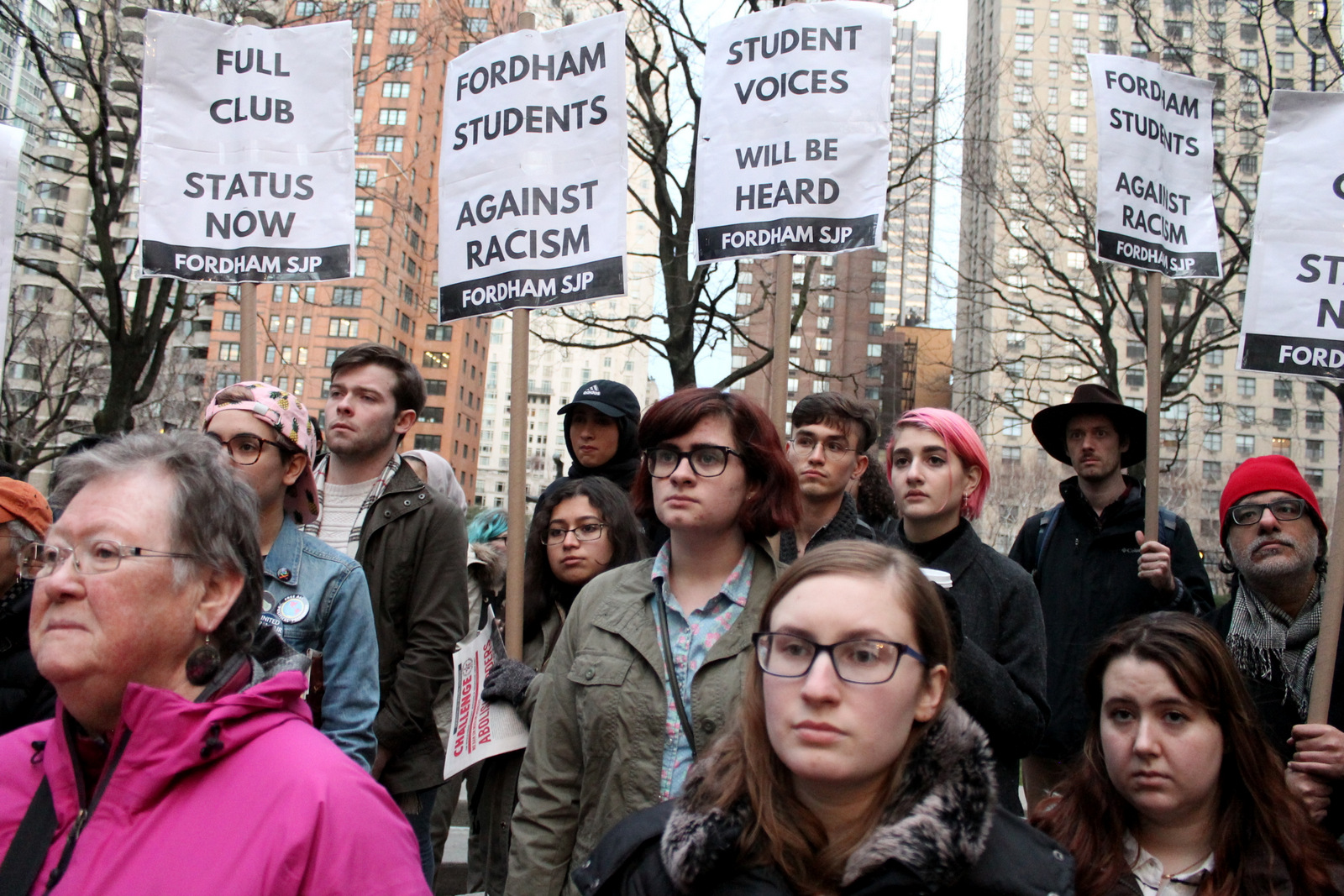
NEW YORK — Fordham University sanctioned a student leader on Thursday, sending senior and Fordham Students for Justice in Palestine lead campus organizer Sapphira Lurie a hand-delivered “disciplinary reprimand” of “official warning” as protests of its refusal to recognize SJP as a campus organization continued.
The admonition came after Lurie declined a bizarre demand by Keith Eldredge, dean of students at Fordham’s Lincoln Center campus, who on Dec. 22 blocked attempts to register SJP with the university, saying in an email that the group’s support for “the call for Boycott, Divestment and Sanctions of Israel presents a barrier to open dialogue and mutual learning and understanding.”
On Wednesday, “He insisted that Fordham policy required he meet alone, behind a closed door, with a student, with a white noise machine turned on,” Radhika Sainath, a Palestine Legal staff attorney and cooperating counsel at the Center for Constitutional Rights who represents Lurie and other SJP activists at Fordham, told MintPress News.
“It’s utterly baffling why Fordham is defending this behavior,” she said. “No student should have to trade a sense of safety for the opportunity to defend herself.”
“He could not point to any policy in the student handbook that justified his insistence that no witnesses or legal counsel enter the meeting,” Lurie told MintPress, adding that her refusal followed “many requests for a fair hearing from myself, my lawyer, the 119 faculty who support me, and the students who rallied behind SJP on Tuesday.”
Before Wednesday, Lurie and her supporters had asked that the case be adjudicated be a neutral decision-maker, or at least observed by an attorney or other witnesses.
Dozens of students and supporters protested at Fordham the night before the meeting to demand the university drop its charges against Lurie and register SJP as a student organization.
The gathering followed another rally on Jan. 23, after which Eldredge had accused Lurie, who participated in it, of violating the university’s demonstration policy.
According to a Feb. 16 statement by Palestine Legal, the dean — who, having issued an unprecedented veto of a United Student Government decision to recognize SJP, was also the protest’s target — personally “filed the complaint, noticed the complaint, will alone conduct the hearing, and determine Sapphira’s guilt and punishment.”
“Dean Eldredge is the prosecutor, witness, judge, jury and sentencer,” Sainath said. “This was a total kangaroo court with no semblance of due process.”
‘A huge embarrassment’

Before the Jan. 23 demonstration, student organizers say, they had apparently followed the policies in Fordham’s student handbook, with one of them going so far as to meet with Eldredge himself the morning of the event.
“Eldredge seemingly gave his permission, designating the student as the event organizer and contact for administration and public safety,” Lurie said.
“More than a week later, on February 1, he sent me a letter informing me that ‘according to information received by [his] office,’ I might have violated the university code of conduct by participating in the rally,” she added. “I later found out that he was the one who submitted said information to himself.”
Some students at the rally on Tuesday speculated that the dean, seen at the Jan. 23 event, took offense to hearing his name in speeches and chants.
His unusual behavior has sparked concern not only among the student body, but also among the faculty, some of whom worry it could affect the school’s reputation.
“For many of us, this is a huge embarrassment,” Fawzia Mustafa, Lurie’s advisor and a professor African and African American Studies and English, told MintPress about Eldredge’s refusal to recognize SJP after its approval by the USG.
About the dean’s strange demand to meet Lurie alone, Mustafa said, “We were dumbfounded. There are moves afoot to address this.”
On Feb. 22, Mustafa and 111 other faculty members sent an open letter to Fordham’s president, Rev. Joseph M. McShane, S.J., protesting the administration’s actions.
“By obstructing the formation of a Fordham chapter of SJP, it interfered with the students’ right to free association,” the letter said. “By banning the club against the wishes of the USG, it disabled the very possibility of a free exchange of ideas. And by pursuing a disciplinary action against Ms. Lurie for protesting that ban, it has further stifled students’ right to free expression.”
By Thursday, the number of its signatories had risen to 119.
In a separate statement emailed to media, the group said some of its members “had already protested the banning of the SJP club at the end of last year. We viewed this as an academic freedom/free speech emergency.”
‘Afraid of the power we have’

Leena Widdi, a first-year student at the Fordham University School of Law and Fordham SJP member, graduated last year from the John Jay College of Criminal Justice, part of the City University of New York system.
She told MintPress that attempts to suppress organizing for Palestine on CUNY campuses, including a formal probe of SJP groups, conducted last year after demands by the Zionist Organization of America and threats to the public university system’s funding by the state, paled in comparison to administrative behavior at Fordham.
At Fordham, repression “is more aggressive and explicit,” Widdi said.
“At CUNY, the administration attempted to put up a facade of promoting the freedom of exchange and ideas, whereas at Fordham the administration is explicit about not wanting any discussion of Zionist crimes,” she added. “CUNY is a public university, so the administration there can get away with less infringement of our rights than Fordham can as a private university.”
By barring even the formation of an SJP group, Fordham seems determined to prevent the lively political atmosphere than has long marked other universities in the city.
With its penalization of Lurie, “Fordham is sending a chilling message that if you support Palestinian rights, you’ll be censored,” Sainath said. “And if you protest that censorship, you’ll be punished. It’s a retaliatory move.”
But the mild sanction of a letter of reprimand also seems designed to avoid any deliberate escalation of a situation in which the university finds itself isolated, with few defenders even among the city’s Zionist establishment.
“He’d like to find me guilty, absolving himself of the many violations of due process he’s committed during this hearing, but he’s too much of a coward to give me more than a warning,” Lurie said.
Eldredge did not respond to a request by MintPress for comment.
On Wednesday, his actions led the Foundation for Individual Rights in Education to name Fordham one of the ten worst colleges for free speech in 2017.
As Lurie received her letter on Thursday, activist group Jewish Voice for Peace launched an online appeal for supporters to call Eldredge and McShane, demanding that Fordham allow SJP to register at the school and stop “retaliating” against students.
Palestine Legal plans to appeal Lurie’s sanction, while on campus, Fordham students are considering the next steps in their campaign.
“Moving forward, we will continue to push for legitimacy on campus,” Lurie said. “We will host events to educate our fellow students about why Palestinian liberation matters so much to us.”
Of Eldredge, she added, “He knows that I have the support of the faculty, the students, and onlookers around the world. He’s afraid of the power we have.”

